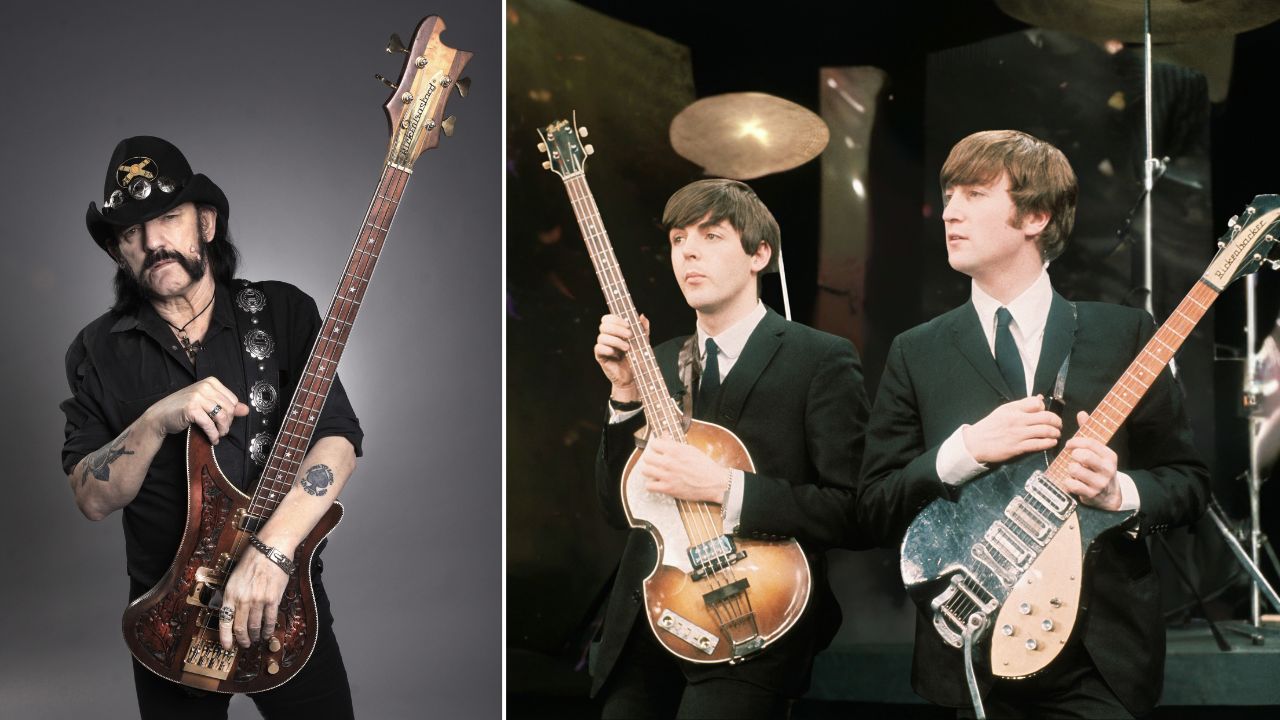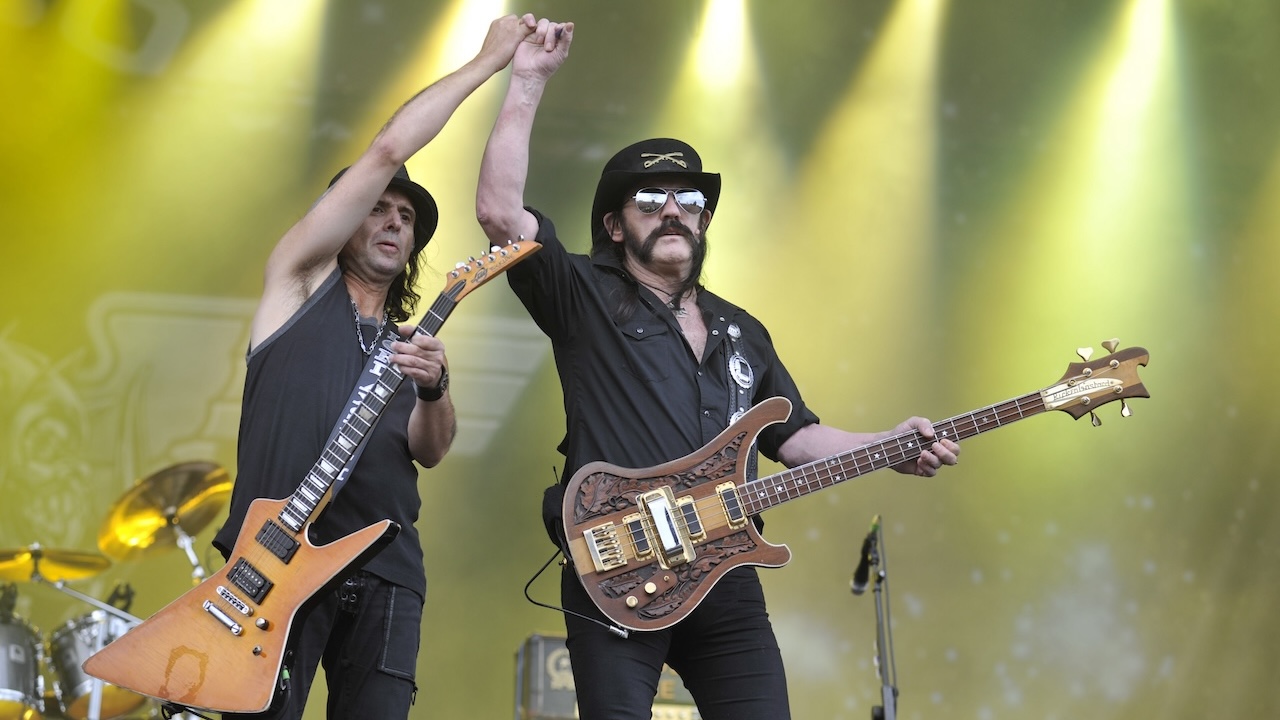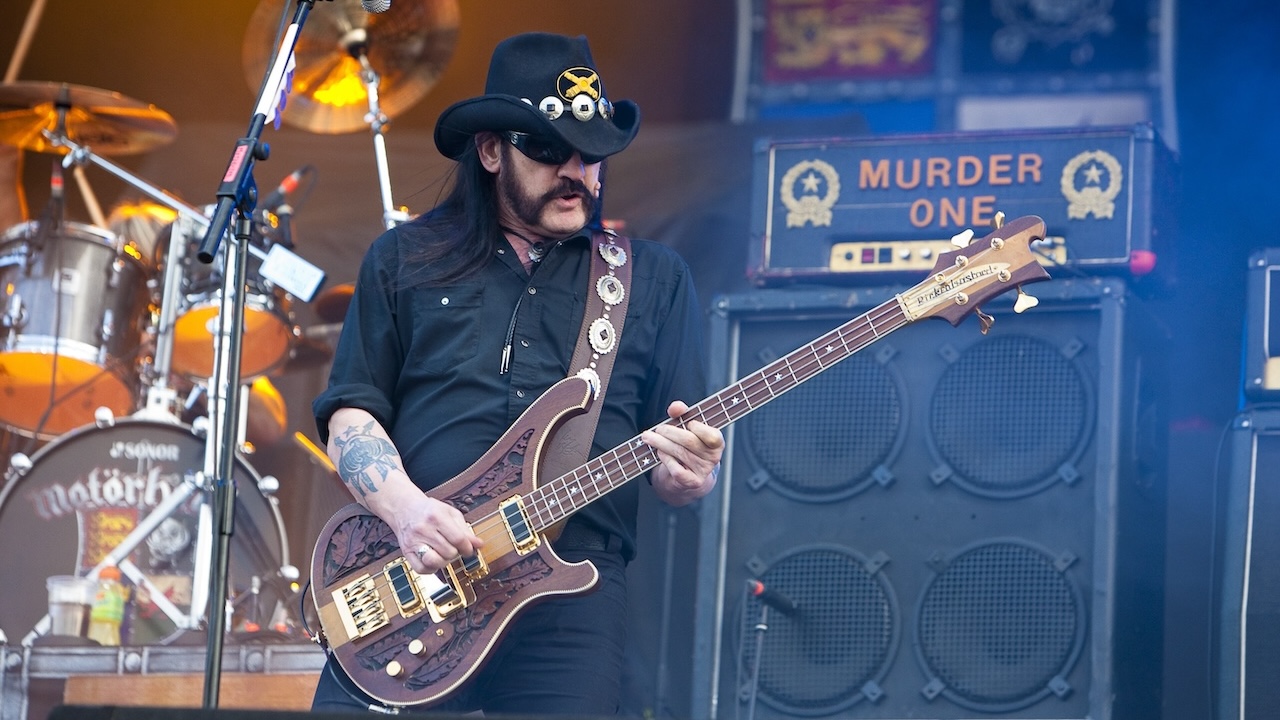“I couldn’t work with John Lennon and Paul McCartney. I’d end up being beaten to death”: When we locked horns with Lemmy to talk Motörhead, Marshalls and why he wouldn’t fit in with one of his favorite bands
In a world full of rock ’n’ roll poseurs, Motörhead's hard-living bassist, Lemmy Kilmister, was a true original

Born Ian Fraser Kilmister on Christmas Eve, 1945, Lemmy kicked off his career as a rhythm guitarist in the Rockin' Vickers, a band that achieved moderate local success around its base in Blackpool, England. But he really carved his name into the tree of rock by working as a roadie for the Jimi Hendrix Experience in 1967.
“When Jimi performed, he was magic,” Lemmy told Rolling Stone. “You would watch him and space and time would stop. After he played, we would have to repair his fuzzboxes because he’d just stomp all over them.”
Following his run with Hendrix, Lemmy parlayed his burgeoning rhythm guitar chops to create a signature style of bass playing in the space-rock outfit Hawkwind. While on tour with the band in 1975, he was pinched for drug possession charges while crossing the Canadian border. The charges were dropped, but the incident led to a falling out with the Hawkwind camp.
Spinning off to form a group of his own, Lemmy enlisted guitarist ‘Fast Eddie’ Clark and drummer Phil ‘Philthy Animal’ Taylor to form Motörhead, a power trio in the truest sense of the word. The band codified its take-no-prisoners approach to rock with the classic 1980 album Ace of Spades.
For someone who started bass only after becoming a professional bassist, Lemmy did pretty well. His hard-hitting pickstyle and midrange drive gave him a unique bass tone that was instantly recognizable.
So who did Lemmy cite as his bass influences? “My idol on bass guitar was always John Entwistle,” he told Bass Player. “He had the same tone – maybe a little deeper. The Who was one of the best bands I've ever heard in my life.”
With its final incarnation of guitarist Phil Campbell and drummer Mikkey Dee, Motörhead's rock recipe remained the same right up until the group disbanded upon Lemmy's death on 28 December 2015.
Get The Pick Newsletter
All the latest guitar news, interviews, lessons, reviews, deals and more, direct to your inbox!

The following interview from the Bass Player archives took place in May 2011.
You've never changed direction to fit in with current trends. What's the secret to the never-say-die ethic?
“That's just it – never say die. And you have to realize one thing: I'm not qualified to do anything else. I am not going to suddenly quit and become an eye surgeon. When we started as a band, some people said we wouldn't last. I can't let those bastards be right. I would rather die. So here we still are, and they're all gone.”
As a songwriter, who are the musicians – living or dead – that you'd most want to collaborate with?
“Kurt Cobain. Lennon and McCartney of course, although I couldn’t work with them. I mean, I’d end up being beaten to death by the awe of it all. I would like to collaborate with Amy Lee from Evanescence. I bet she is a really good writer.”
After so many years of constant touring, do you ever get to the point where you think, God, do I have to play Ace of Spades again?
“I used to have that thought, but I killed it. Ace of Spades has been really good to us, and it's one of the best songs that I ever wrote. So I suppose you have to put up with it, because everybody wants to hear it, every night.”
“You have to realize that just because you have played it every night, it may be the first time that someone has ever seen us, and they have to hear Ace of Spades, because it's part of our fabric. It wouldn't be fair not to play it.”
Motörhead made the Guinness Book of Records for being the world's loudest band. What are your thoughts on volume?
“By its very nature, rock 'n' roll is supposed to be loud. Quiet rock 'n' roll is nonsense.”
You have played Rickenbacker basses and Marshall amps for ages. What first drew you to that gear?
“I saw the Who using Marshalls, and they sounded wonderful. When I was working for Hendrix, he was using them as well. I got my first stack when I was with Hawkwind, and it sounded fantastic.
“I first got the Rickenbacker just for its wild shape. Plus, the neck was really skinny; I'm a guitarist turned bass player, so it was easier for me to play.”
What about the history, death, and eventual resurrection of your Murder One Marshall amp?
“The Marshall JMP Super Bass MkII head is quite an exotic animal nowadays – they are like antiques. But now Marshall has started to make the Lemmy signature stack, so they copied the Murder One.
“We actually had to do without Murder One for a while so Marshall could copy it; they had lost the blueprints to the original. For the cabs, I use a 4x15 cab and a 4x12 in each stack. I have two stacks onstage.”
That's some serious power.
“Yeah, it is. That's what I was after. I don't like to be mumbling away in the background; like a guitar player, I want to be heard. After all, I am a frontman – I didn't get into this thing to not be noticed.”
Was there a defining moment when you decided you wanted to play rock 'n' roll for a living?
“I used to watch Oh Boy!, a show on English TV in the late '50s that always had visiting singers, and they had Eddie Cochran and Gene Vincent on one night. They were both great, and they were surrounded by screaming women who appeared to be tearing their clothes off. That was the moment I realized rock 'n' roll was the job for me. It was like an invocation, being called to the priesthood.”
Whether it's the logo or record covers, Motörhead is one of the most significant brands in rock. How much thought went into the band's branding?
“Back in the '60s, almost every band had a distinctive way of writing their band name. You know, the Yardbirds, the Beatles, and the Who all had their logos on their kick drums and record covers. That's where I come from. As a band, you've got to stand out.”
You have one of the most recognizable images in rock. How important do you think it's been to your career?
“Very! It was essential. You see that every night with Ozzy, don't you? You would recognize that guy from 30 miles away.”

What continues to inspire you?
“Not enough people have heard us yet. We aren't selling a ton of records, but I will keep on making 'em until people do buy them. If people want us to stop making records, all they need to do is give us a No. 1 hit!”
What wisdom can you share about your career to a young player looking to move up?
“There is no real advice you can give to anyone about anything. If you want to do something enough, you will just cope with it you know? Stop waiting on a bailout clause from someone else's advice, because that won't help. It won't be a cushion, and it certainly won't help you avoid anything in the future.”
What is the future of rock 'n' roll?
“I have no idea. I hope it cures up a bit, though, because it's been pretty miserable for a long time.”

Nick Wells was the Editor of Bass Guitar magazine from 2009 to 2011, before making strides into the world of Artist Relations with Sheldon Dingwall and Dingwall Guitars. He's also the producer of bass-centric documentaries, Walking the Changes and Beneath the Bassline, as well as Production Manager and Artist Liaison for ScottsBassLessons. In his free time, you'll find him jumping around his bedroom to Kool & The Gang while hammering the life out of his P-Bass.
“When I first heard his voice in my headphones, there was that moment of, ‘My God! I’m recording with David Bowie!’” Bassist Tim Lefebvre on the making of David Bowie's Lazarus
“One of the guys said, ‘Joni, there’s this weird bass player in Florida, you’d probably like him’”: How Joni Mitchell formed an unlikely partnership with Jaco Pastorius





![[from left] George Harrison with his Gretsch Country Gentleman, Norman Harris of Norman's Rare Guitars holds a gold-top Les Paul, John Fogerty with his legendary 1969 Rickenbacker](https://cdn.mos.cms.futurecdn.net/TuH3nuhn9etqjdn5sy4ntW.jpg)







